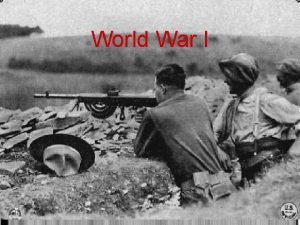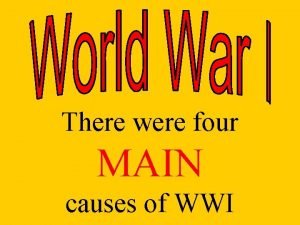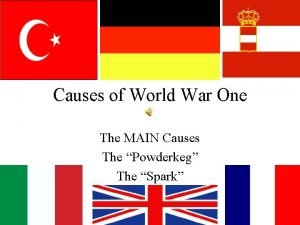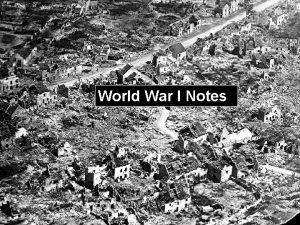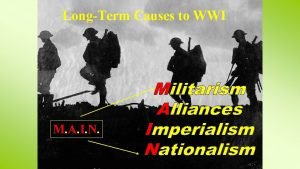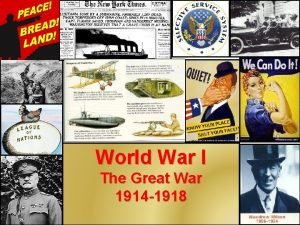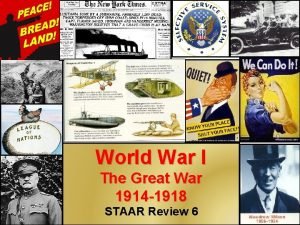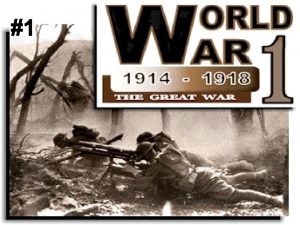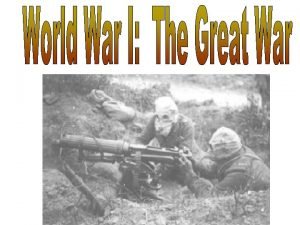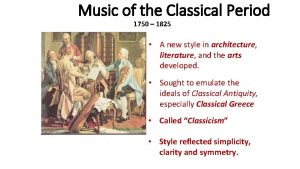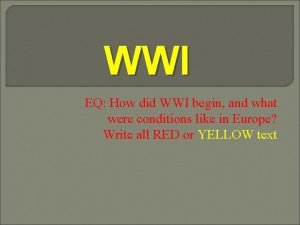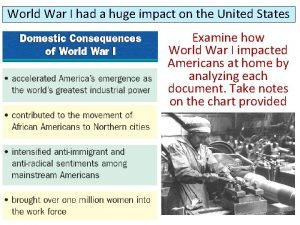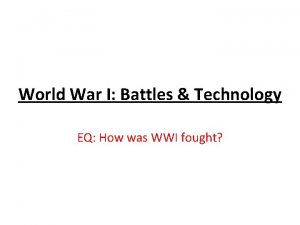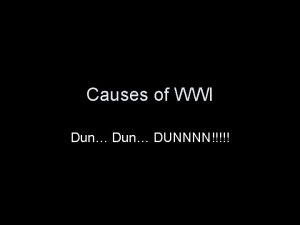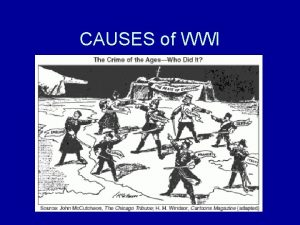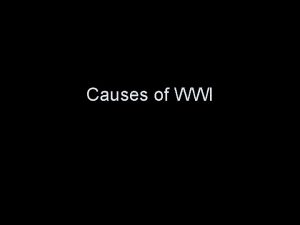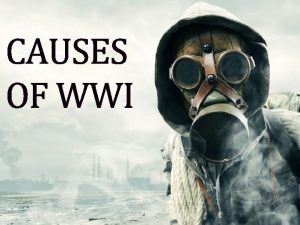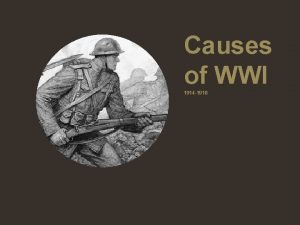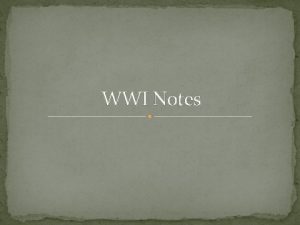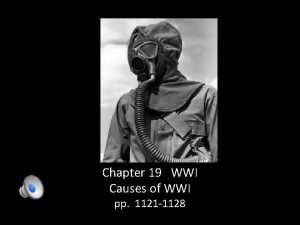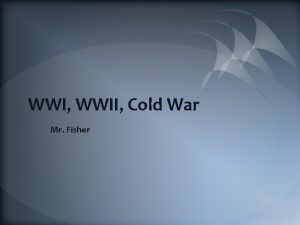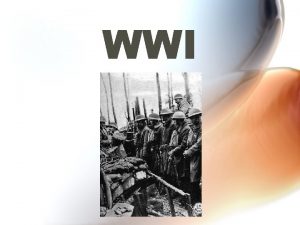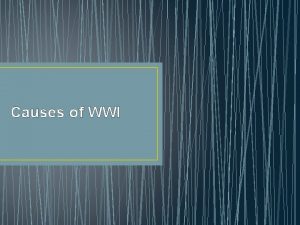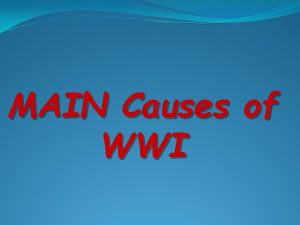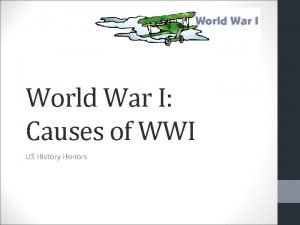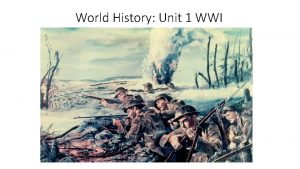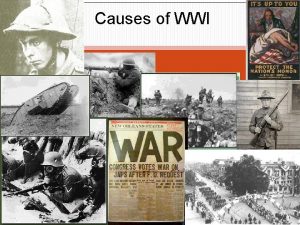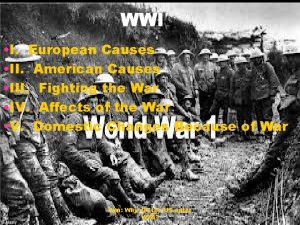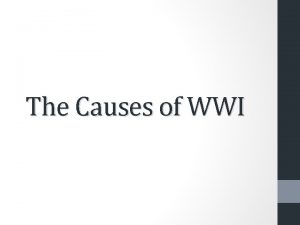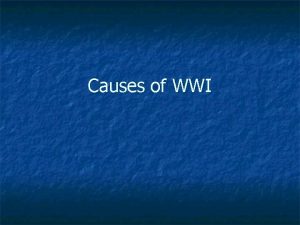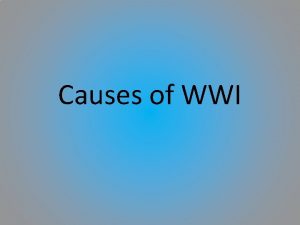AP World History WWI Period 6 I Causes































- Slides: 31

AP World History: WWI Period 6

I Causes of World War One “The Great War” A) The creation of alliances As well as seeking protection in the size of their armies, the countries of Europe sought protection by forming alliances. 1. At first, Bismarck had kept Germany friendly with Russia. Kaiser Wilhelm overturned this, and concentrated instead on the Dual Alliance of 1879 between Germany and Austria-Hungary - which became the Triple Alliance (or Central Powers Alliance) when Italy joined in 1882. 2. Alarmed by this strong central bloc: a. France in 1894 made an alliance with Russia b. In 1904 France made an agreement with Britain called the Entente Cordiale (= ‘Friendly Relationship’ – not a formal alliance, but a promise to work together). c. In 1907, Britain made an entente with Russia, thus forming the Triple Entente (France, Russia, Great Britain). d. In 1902 Britain made a naval treaty with Japan. 3. The countries of Europe thought that the alliance system would act as a deterrent to war; in fact it tied the countries together so that, when one country went to war, the others felt themselves obliged to follow.

Causes of World War One Continued… 3. 1902 Britain formed an alliance with Japan to limit German colonial gains in the East. 4. 1904 Britain signed the Entente Cordiale with France to resolve conflicts overseas colonies. 5. 1907 Russia formed the Triple Entente with Britain and France. 6. The Ottoman Empire had initially aimed to stay neutral in World War I, it soon concluded an alliance with Germany and entered the war on the side of the Central Powers in October 1914.

Causes of World War One Continued… B) The Russo-Japanese War 1. 1904 Japan went to war with Russia over the disputed territories of Korea and Manchuria. 2. Japan had a surprise victory in 1905. (Recall their military had modernized due to the Meiji Restoration). 3. The U. S. President, Theodore Roosevelt, mediated a peace agreement between Japan and Russia. (Treaty of Portsmouth) The scale of Russia's defeat contributed to an attempted Russian Revolution in 1905, and Tsar Nicholas II was determined to restore Russian prestige. Russian Troops in Manchuria

Causes of World War One Continued… C) The Arms Race by 1914 As one country increased its armies, so all the others felt obliged to increase their armed forces to keep the ‘balance of power’. Germany: 2, 200, 000 soldiers, 97 warships Austria-Hungary: 810, 000 soldiers, 28 warships. Italy: 750, 000 soldiers, 36 warships France: 1, 125, 000 soldiers, 62 warships Russia: 1, 200, 000 soldiers, 30 warships Great Britain: 711, 000 soldiers, 185 warships 1910 -1914 Increase in Defense Expenditures France 10% Britain 13% Russia 39% Germany 73%

Causes of World War One D) Nationalism made the ethnic. Continued… groups ruled by the Ottoman Empire (such as the Romanians and the Bulgarians) and by Austria-Hungary (such as the Serbs) want to be free to rule themselves. 1. In the Balkans this was called ‘Panslavism’ because the people who wanted to be free were all Slavic. 2. The most nationalistic of all were the Serbs – Serbia had became an independent country in 1878, but in 1900 many Serbs were still ruled by the Ottoman Empire and Austria-Hungary. This led to a destabilized Balkan peninsula. Modern Serbians Playing Traditional Folk Music



II The Keg Blows A) “The archduke traveled to Sarajevo in June 1914 to inspect the imperial armed forces in Bosnia and Herzegovina, former Ottoman territories in the turbulent Balkan region that were annexed by Austria. Hungary in 1908 to the indignation of Serbian nationalists, who believed they should become part of the newly independent and ambitious Serbian nation. The date scheduled for his visit, June 28, coincided with the anniversary of the First Battle of Kosovo in 1389, in which medieval Serbia was defeated by the Turks; June 28 was a day of great significance to Serbian nationalists, and one on which they could be expected to take exception to a demonstration of Austrian imperial strength in Bosnia. June 28 was also Franz Ferdinand's wedding anniversary. On June 28, 1914, then, Franz Ferdinand Sophie were touring Sarajevo in an open car, with surprisingly little security, when Serbian nationalist Nedjelko Cabrinovic threw a bomb at their car; it rolled off the back of the vehicle and wounded an officer and some bystanders.

The Keg Blows Continued… Later that day, on the way to visit the injured officer, 19 -year-old Gavrilo Princip fired into the car, shooting Franz Ferdinand Sophie at point-blank range. Princip then turned the gun on himself, but was prevented from shooting it by a bystander who threw himself upon the young assassin. A mob of angry onlookers attacked Princip, who fought back and was subsequently wrestled away by the police. Meanwhile, Franz Ferdinand Sophie lay fatally wounded in their limousine as it rushed to seek help; they both died within the hour. The assassination of Franz-Ferdinand Sophie set off a rapid chain of events: Austria-Hungary, like many in countries around the world, blamed the Serbian government for the attack and hoped to use the incident as justification for settling the question of Slav nationalism once and for all. As Russia supported Serbia, an Austro-Hungarian declaration of war was delayed until its leaders received assurances from German leader Kaiser Wilhelm that Germany would support their cause in the event of a Russian intervention–which would likely involve Russia's ally, France, and possibly Britain as well. On July 28, Austria-Hungary declared war on Serbia, and the tenuous peace between Europe's great powers collapsed. Within a week, Russia, Belgium, France, Great Britain and Serbia had lined up against Austria. Hungary and Germany, and World War I had begun. ” –www. history. com

The Keg Blows Continued… "As the car quickly reversed, a thin stream of blood spurted from His Highness's mouth onto my right check. As I was pulling out my handkerchief to wipe the blood away from his mouth, the Duchess cried out to him, 'In Heaven's name, what has happened to you? ' At that she slid off the seat and lay on the floor of the car, with her face between his knees. ” Count Franz von Harrach rode on the running board of the royal car serving as a bodyguard for the Archduke Francis Ferdinand His Family



III A New Kind of War A) New technologies were used 1. Machine guns 2. Tanks 3. Flame throwers 4. Depth-charge (deep water) torpedoes 5. Barbed wire 6. Airplanes and air traffic control 7. Poison Gas 8. Air craft carriers B) Trench Warfare was used on an unprecedented scale. Opposing armies conduct battle, at relatively close range, from a series of ditches dug into the ground. It becomes necessary when two armies face a stalemate, with neither side able to advance and overtake the other.




IV The US Entered the War A) At the start of WWI, US president Woodrow Wilson pledged neutrality. B) Tensions arose when Germany tried to quarantine Britain, an American ally. C) 1915 Germany announced unrestricted warfare against all ships (even neutral ones) near Britain. On May 7, 1915 the British-owned Lusitania was torpedoed without warning off the coast of Ireland. Of the nearly 2, 000 passengers aboard, 1, 201 were killed, including 128 Americans. D) April 6, 1917 the US Congress formally entered the war. E) As there were only approximately 100, 000 American soldiers ready, the US adopted a policy of conscription (a draft).

US Entered the War Continued…

Russian Poster to Buy War Bonds

V Women and the War A) After the United States entered the war in 1917, women supported the war effort in numerous ways. Women sold war bonds and conserved food. Women sent relief supplies to suffering Europeans. B) During the war, women also entered the workforce in new ways. Women served in the navy and marines, and thousands served as nurses. On the home front, women worked in factories and in the government. C) WWI led to several important advances for women. Women’s war work increased support for women’s suffrage (the right to vote) and contributed to the passage of the 19 th Amendment in 1920. In addition, during the war, the Department of Labor created the Women in Industry Service. After the war, the Women in Industry Service became the Women’s Bureau, headed by Mary van Kleeck. http: //www. nwhm. org


VI The End of the War? A) After the surrender of Austria-Hungary, Bulgaria and the Ottoman Empire, Germany was forced to seek an armistice with the Allies on November 11, 1918. B) The Paris Peace Conference began on January 18, 1919 to debate the terms of the Versailles Peace Treaty. Germany was not invited. The “Big Three” who were the most influential in the debates were Prime Minister David Lloyd George of the United Kingdom, Prime Minister Georges Clemenceau of France, and President Woodrow Wilson of the United States. C) The terms of the Versailles Treaty were so hostile to Germany that German Chancellor Philipp Scheidemann resigned rather than sign it. However, Germany realized they had to sign it for they no longer had any military power left to resist. D) On June 28, 1919, Germany's representatives signed the Versailles Treaty.

The “Big Three” and the Signing of the Treaty of Versailles David Lloyd Georges Clemenceau Woodrow Wilson

The Treaty of Versailles Excerpts ARTICLE 160. By a date which must not be later than March 31, 1920, the German Army must not comprise more than seven divisions of infantry and three divisions of cavalry. After that date the total number of effectives in the Army of the States constituting Germany must not exceed one hundred thousand men, including officers and establishments of depots. . . The total effective strength of officers, including the personnel of staffs, whatever their composition, must not exceed four thousand. ARTICLE 198. The armed forces of Germany must not include any military or naval air forces. ARTICLE 231. The Allied and Associated Governments affirm and Germany accepts the responsibility of Germany and her allies for causing all the loss and damage to which the Allied and Associated Governments and their nationals have been subjected as a consequence of the war imposed upon them by the aggression of Germany and her allies. ARTICLE 232. The Allied and Associated Governments recognise that the resources of Germany are not adequate, after taking into account permanent diminutions of such resources which will result from other provisions of the present Treaty, to make complete reparation for all such loss and damage. The Allied and Associated Governments, however, require, and Germany undertakes, that she will make compensation for all damage done to the civilian population of the Allied and Associated Powers and to their property during the period of the belligerency of each as an Allied or Associated Power against Germany by such aggression by land, by sea and from the air, and in general all damage as defined in Annex l hereto.

VI The League of Nations A) In front of the U. S. Congress on January 8, 1918, President Woodrow Wilson enumerated the last of his Fourteen Points, calling for a “general association of nations…formed on the basis of covenants designed to create mutual guarantees of the political independence and territorial integrity of States, large and small equally. ” B) Wilson used his tremendous influence to attach the charter of the League of Nations to the Treaty of Versailles. C) Due to concerns that the League would commit the United States to an organization that would reduce the United States’ ability to defend its own interests, the Senate voted to not join. 9 months later Warren Harding won the presidential election on the platform of opposing the League.

VII Costs of the War During mid-1918, Europe was hit by Spanish flu and an estimated 25 million people died. ****Germany finished paying its reparations Oct 3, 2010.

Costs of the War Continued… “Before World War I Germany was a prosperous country, with a gold-backed currency, expanding industry, and world leadership in optics, chemicals, and machinery. The German Mark, the British shilling, the French franc, and the Italian lira all had about equal value, and all were exchanged four or five to the dollar. That was in 1914. In 1923, at the most fevered moment of the German hyperinflation, the exchange rate between the dollar and the Mark was one trillion Marks to one dollar, and a wheelbarrow full of money would not even buy a newspaper. ” - George J. W. Goodman, 1923 “ The Treaty of Versailles is worthless. 60 million German hearts and minds are on fire with anger and shame. They will cry out “We want war!” –Adolf Hitler, Mein Kamph 1924



Focus Questions 1. 2. 3. 4. 5. What were the main causes of WWI? Could WWI have been avoided? How was WWI different from previous wars? Does WWI deserve to be called the “Great War”? If you were the US president, would you have signed the Treaty of Versailles as it was written? Why or why not? 6. Do you think that the Treaty of Versailles was truly intended to prevent future world wars? 7. Was WWI truly over?
 Causes of wwi main
Causes of wwi main What were the m.a.i.n. causes of wwi
What were the m.a.i.n. causes of wwi Mains ww1
Mains ww1 Causes of world war 1 mania
Causes of world war 1 mania Main long term & immediate causes of wwi
Main long term & immediate causes of wwi 4 causes of wwi
4 causes of wwi The 4 causes of ww1
The 4 causes of ww1 Causes of wwi (mania)
Causes of wwi (mania) Mania acronym for causes of wwi
Mania acronym for causes of wwi Whap period 3
Whap period 3 Ap world history period 2 test
Ap world history period 2 test Ap world history chapter 25 africa and the atlantic world
Ap world history chapter 25 africa and the atlantic world Bad dangerous tour
Bad dangerous tour Proximate causes of behavior
Proximate causes of behavior Proximate behaviour in animals
Proximate behaviour in animals Cynthia lightfoot
Cynthia lightfoot Absolute refractory period and relative refractory period
Absolute refractory period and relative refractory period Absolute refractory period and relative refractory period
Absolute refractory period and relative refractory period Critical period vs sensitive period
Critical period vs sensitive period Critical period
Critical period Critical period vs sensitive period
Critical period vs sensitive period Music of the classical period (1750 to 1820)
Music of the classical period (1750 to 1820) Period 6 gas 86 protons
Period 6 gas 86 protons Important key points of period of activism
Important key points of period of activism Stability period vs measurement period
Stability period vs measurement period Trustee period and royal period
Trustee period and royal period Prehistory timeline
Prehistory timeline Ww1 webquest answer key
Ww1 webquest answer key Where did wwi begin?
Where did wwi begin? Sides of wwi
Sides of wwi Impact of wwi
Impact of wwi New technology in wwi
New technology in wwi
